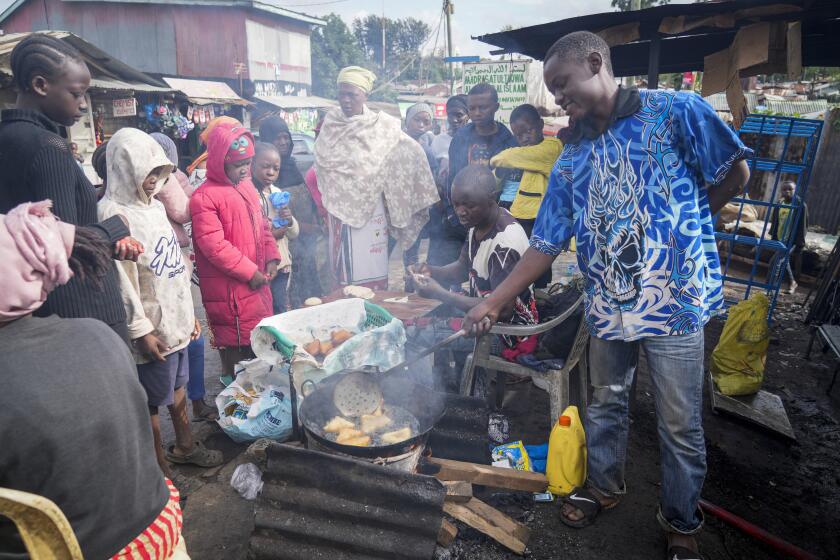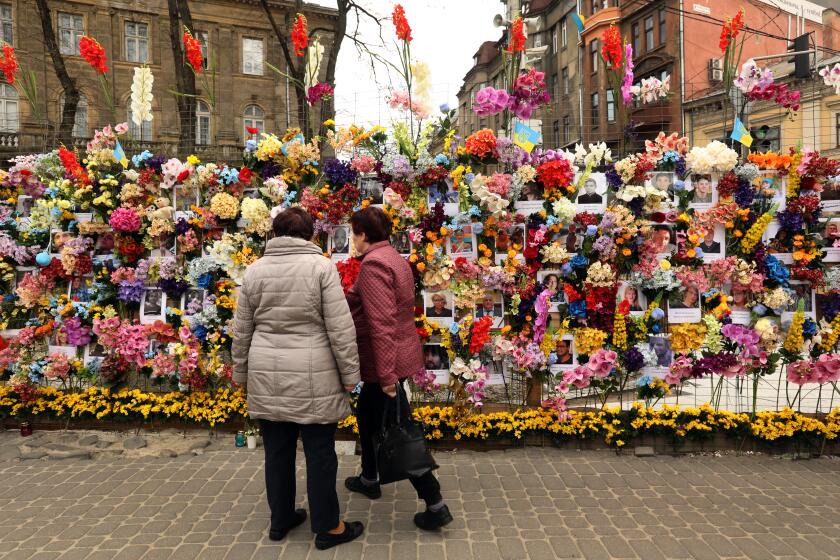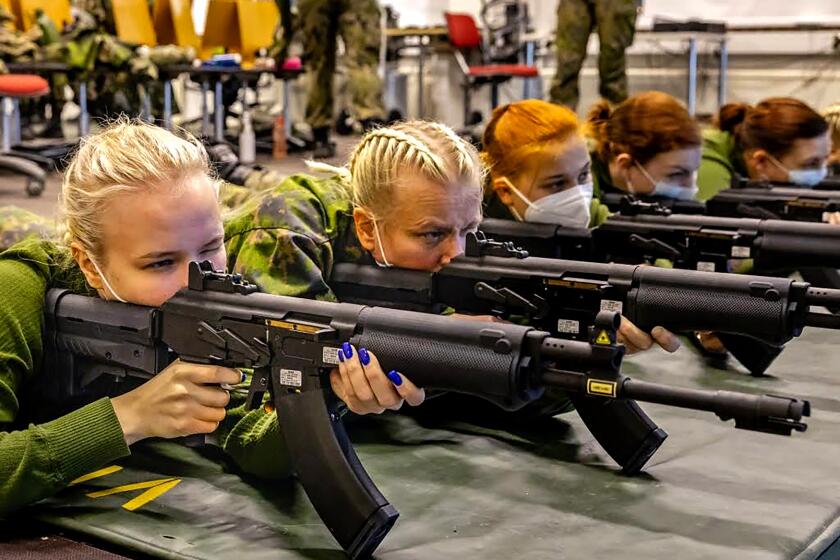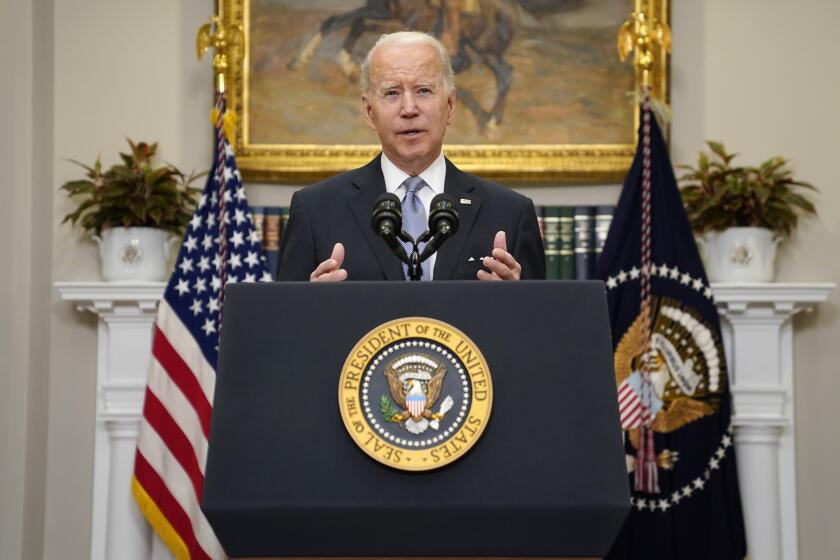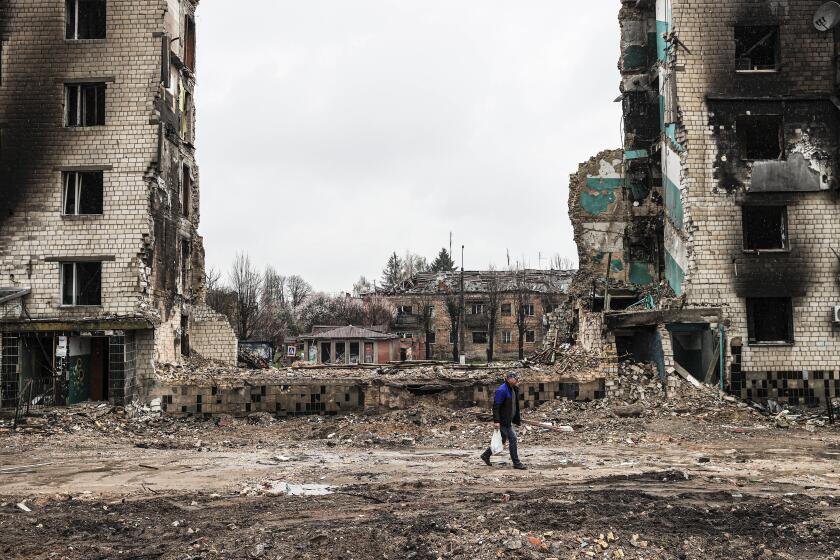Russia raises nuclear tensions as Ukraine’s allies promise more arms
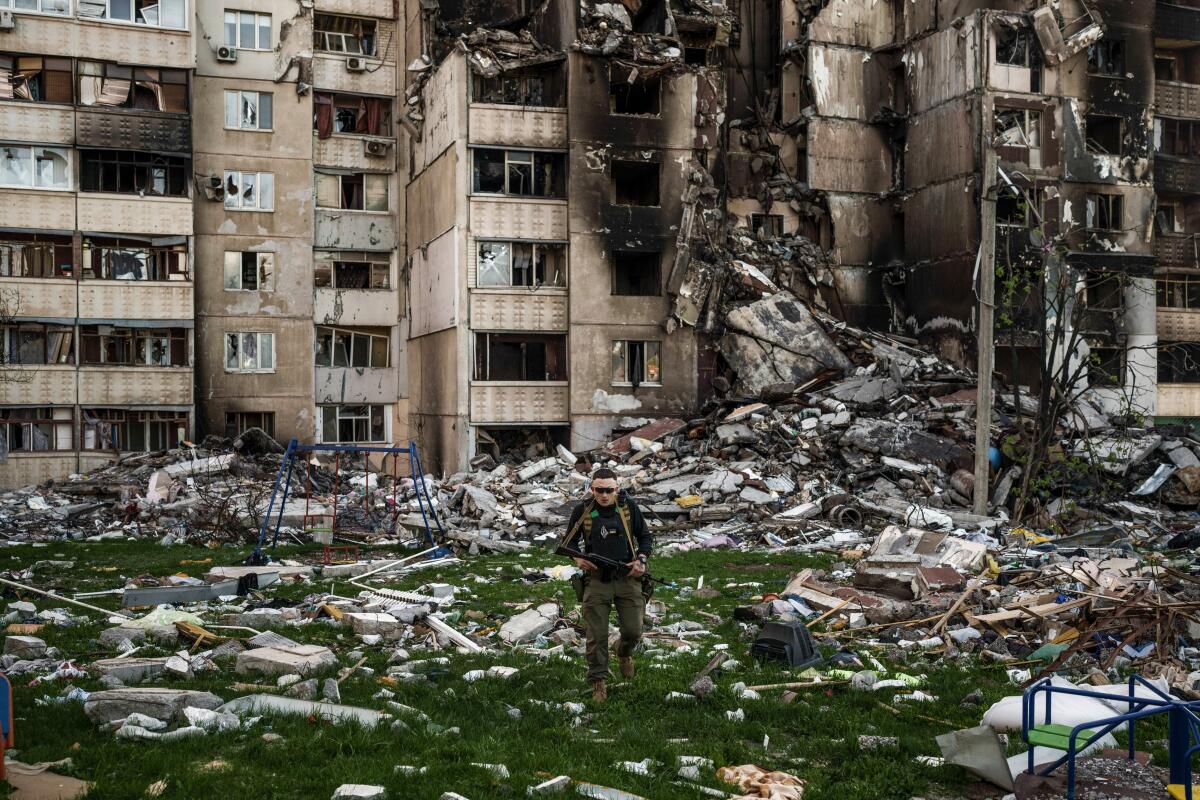
- Share via
KHARKIV, Ukraine — The United States rallied 40 nations Tuesday to provide long-term military aid to Ukraine as Russia raised the specter of nuclear war if NATO members keep sending arms to the embattled country.
In an apparent response to U.S. Defense Secretary Lloyd J. Austin III, who said Monday that the U.S. wanted Russia permanently “weakened,” Russian Foreign Minister Sergei Lavrov accused the United States of escalating tensions.
Asked on Russian TV whether the current situation was comparable to the Cuban missile crisis, which brought the U.S. and Russia to the brink of nuclear war in 1962, Lavrov said his country wants to avoid nuclear conflict, and then added: “The danger is serious, it’s real. It should not be underestimated.”
“NATO, in essence, is engaged in a war with Russia through a proxy and is arming that proxy,” he said. “War means war.”
Defense officials from dozens of countries met at the U.S. air base in Ramstein, Germany, where the agenda focused on accelerating the arms shipments. In a dramatic shift, Germany announced that for the first time it would send air-defense tanks to Ukraine. Other nations pledged howitzers, tanks, rockets, drones, hand grenades and rifles.
Russia expanded its assault on southern and eastern regions of Ukraine overnight, saying its forces killed 500 “enemy personnel” — a claim that could not be verified — and hit military targets in Kharkiv, Ukraine’s second-largest city. Ukraine cited fresh attacks on civilians as well as military sites.
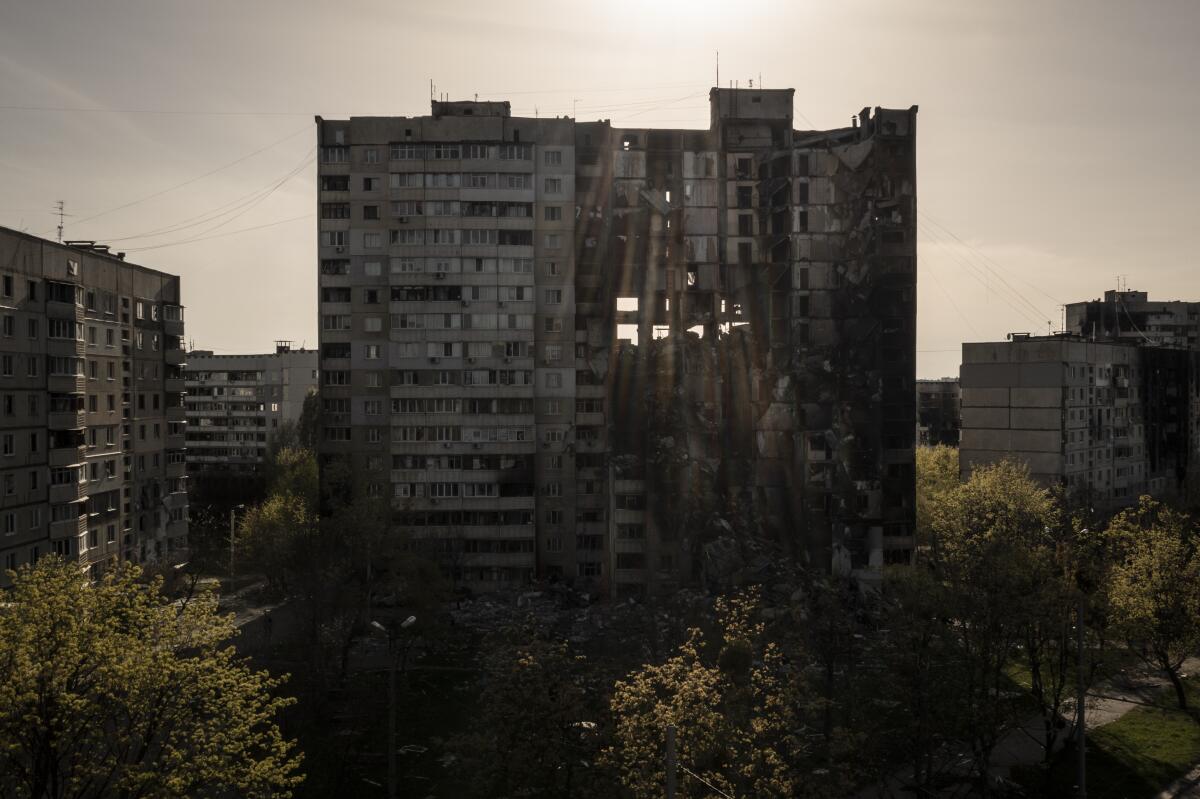
“Russian troops have launched an offensive in all directions,” said Oleksiy Arestovych, an advisor to Ukrainian President Volodymyr Zelensky.
He said Russia was zeroing in on the cities of Kramatorsk and Slovyansk in the east and Kryvyi Rih — Zelensky’s hometown — in the south.
The war between Ukraine and Russia, which supply 75% of the world’s sunflower oil, has caused already-rising cooking oil prices to spiral upward.
The British Defense Ministry said Tuesday that Russians had also overtaken the city of Kreminna, in the Luhansk region, though Ukraine did not confirm the city’s fall.
Officials said two missiles struck the central city of Zaporizhzhia, killing at least one person.
In the southern city of Kherson, which fell to Russia early in the war, the occupiers have scheduled a vote this week on the creation of a so-called independent Kherson People’s Republic.
The move, which Zelensky called a “sham referendum,” would follow a long-term Russian strategy of fomenting unrest in the eastern region of Donbas, where pro-Russia separatists have already declared breakaway republics in Luhansk and Donetsk.
Russian President Vladimir Putin has said that a chief reason he invaded Ukraine was to “liberate” ethnic Russians.
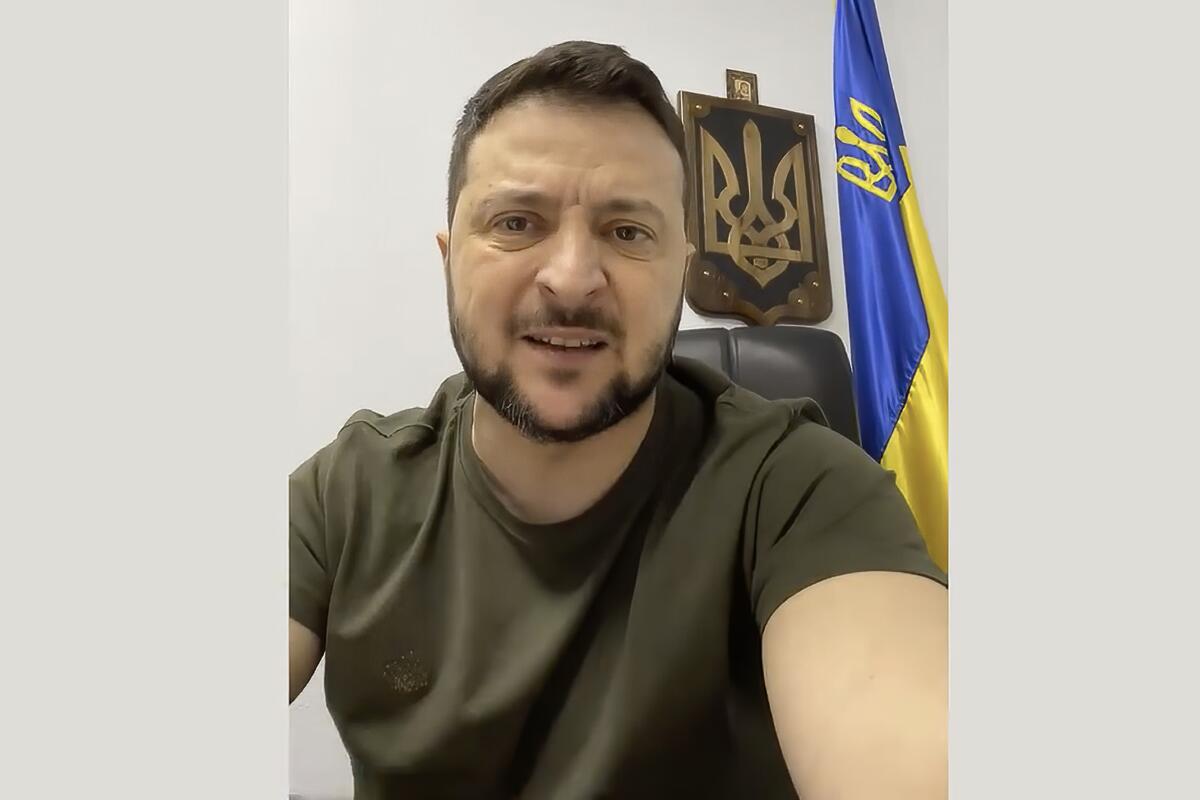
The war, now in its third month, has left mass graves and rubble in cities and towns across Ukraine, including the southern port of Mariupol, which Russia claimed victory over last week even as a group of Ukrainian troops remains holed up in a sprawling steel plant. Mariupol Mayor Vadym Boychenko said a new mass grave — the third to be named, this time in the village of Staryi Krym — was discovered just outside the city.
Photojournalist Carolyn Cole documents Ukrainian life amid Russia’s invasion.
Kyiv, the capital, which has largely been spared attack over the last month as Russia shifted its offensive south and east, imposed a nightly curfew this week amid increasing concerns about further violence. And in the Black Sea port of Odesa, authorities reported an explosion that damaged a bridge over the Dniester River and cut off rail connections with neighboring Romania.
In an overnight video address, Zelensky said Ukraine — which has lost about 3,000 troops compared with unconfirmed estimates of up to 15,000 deaths among the Russians — would keep fighting to “make the occupiers’ stay in our land even more intolerable.”
Finland has long seen Russia as a threat. Now politicians and ordinary Finns are saying it aloud.
Zelensky and Ukraine’s foreign minister, Dmytro Kuleba, have dismissed the Russian warnings of nuclear conflict.
“Russia loses last hope to scare the world off supporting Ukraine,” Kuleba tweeted. “Thus, the talk of a ‘real’ danger of WWIII. This only means Moscow senses defeat.”
The war also continued to spill into neighboring Moldova, where local officials in Transnistria, a pro-Russia breakaway enclave, said two radio towers were damaged in explosions Tuesday — a day after similar explosions were reported in the region’s capital, Tiraspol.
Ukraine’s intelligence agency has described such attacks as “planned provocation” by Russian intelligence. Last week, a senior Russian military official told state media that Russia wanted control of southern Ukraine in order to have a land corridor to Transnistria, also known as Trans-Dniester.
The Russian invasion of Ukraine has now brought about a sea change in U.S. foreign policy.
At the summit in Germany, the U.S. Defense secretary described Ukraine as “fighting a war of necessity to defend its democracy, its sovereignty and its citizens.”
“Russia’s invasion is indefensible, and so are Russian atrocities,” Austin said, adding that Russia has already been significantly weakened after two months of fighting.
“Casualties are pretty substantial,” he told reporters at the air base. “They’ve lost a lot of equipment. They’ve used a lot of precision-guided munitions. … And so they are in fact, in terms of military capability, weaker than when they started.”
Austin said again that the United States aimed to ensure that Russia is never again able to invade a peaceful neighbor. He also derided Russian comments warning of possible nuclear warfare as “clearly unhelpful” saber rattling.
Gen. Mark A. Milley, chairman of the Joint Chiefs of Staff, told those attending the summit that “time is not on Ukraine’s side.”
“The outcome of this battle, right here, today, is dependent on the people in this room,” he said.
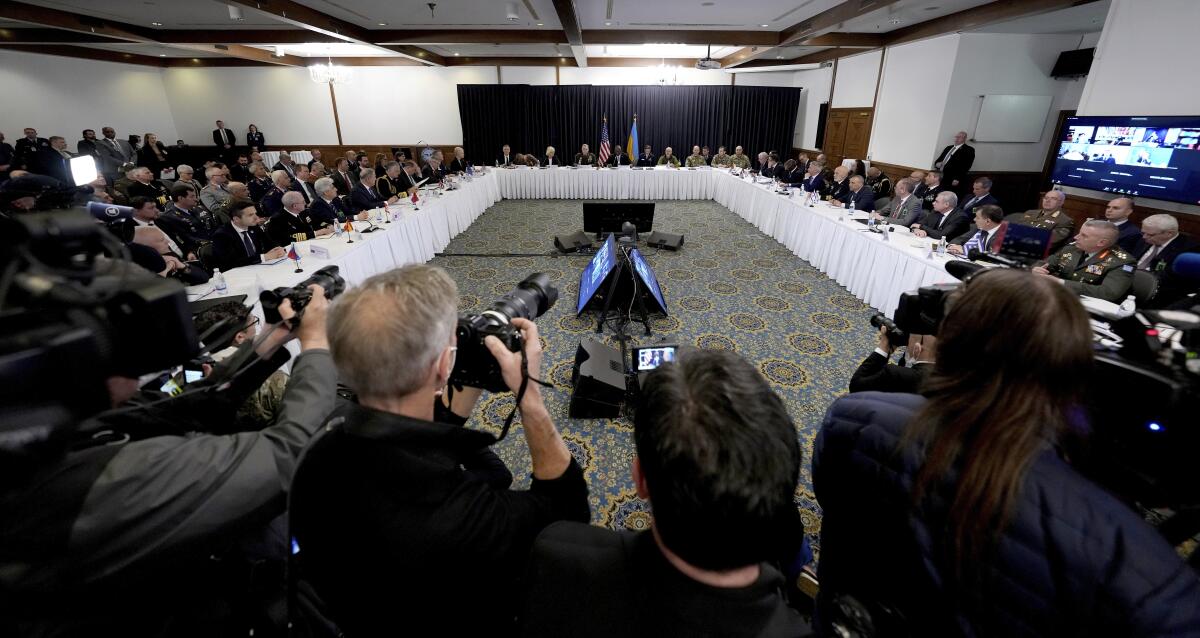
The attendees included representatives from major European nations as well as Turkey and Israel. South Africa and Japan participated virtually.
Ukrainian leaders, who did not succeed in earlier attempts to secure a no-fly zone enforced by the North Atlantic Treaty Organization to prevent Russian attacks, had redoubled their efforts on asking for more and deadlier armaments.
Russian forces have more artillery, tanks and heavy fighting units than Ukraine, but they have been plagued by problems as they enter a pivotal battle for eastern Ukraine.
“We say again and again: weapon, weapons, weapons! We need weapons to keep standing and defending the values of humankind,” Lesia Vasylenko, a member of the Ukrainian parliament, tweeted Tuesday.
State Department spokesman Ned Price said that in addition to pledging billions in military and humanitarian aid, the U.S. is also holding Moscow accountable through sanctions, export controls and visa restrictions.
“The Moscow that prepared to invade and that on Feb. 24 went forward with its invasion will not be the same Russian Federation in terms of its positioning on the world stage,” he said. “You can already see the toll on Russia’s economy and its financial system.”
He added: “Not only will Ukraine emerge sovereign and independent when this is over, but Moscow will emerge weaker.”
Pushing back against sanctions, Russia will suspend natural gas deliveries to both Poland and Bulgaria starting Wednesday, according to officials from both countries. It is the first time Putin has made good on his threat to cut off “unfriendly foreign buyers” unless they pay in Russian rubles.
Meanwhile, United Nations Secretary-General Antonio Guterres met with Putin and Lavrov in Moscow on Tuesday.
Underscoring the difficulty of ending a war that has raged without pause through multiple rounds of negotiations, Guterres told reporters in Moscow that his “very frank discussion” with Lavrov showed “it is clear that there are two different positions on what is happening in Ukraine.”
He said the U.N. was looking for opportunities to negotiate cease-fires to move civilians to safety.
“We urgently need humanitarian corridors that are truly safe and effective and that are respected by all to evacuate civilians and deliver much-needed assistance,” he said.
Guterres is to travel Thursday to Kyiv to meet Zelensky.
The war has resulted in a refugee crisis unseen since World War II, with 5.2 million people fleeing Ukraine — a total that the U.N. said could eventually reach 8.3 million. More than 8 million people have been internally displaced.
Start your day right
Sign up for Essential California for the L.A. Times biggest news, features and recommendations in your inbox six days a week.
You may occasionally receive promotional content from the Los Angeles Times.
Among the cities hardest hit has been Kharkiv, which lies about 25 miles from the Russian border and has been subjected to near-daily shelling — including in residential zones — since the war began.
On Tuesday, a road on Kharkiv’s outskirts was full of hundreds of people lined up in front of a half-constructed church, where aid workers with the Noah’s Ark Church organization were distributing food.
“Please don’t push. There’s enough food for everyone,” said one man in sunglasses who stood at the gate to manage the crowd. “Be calm, praise God, and glory to Ukraine.”
Inside were pallets loaded with bags of potatoes and onions and boxes of apples. There were also items that reflected the difficulty of maintaining a semblance of ordinary life in a city pummeled daily by Russian forces: cleaning products, matches, small candles.
“There’s a lot of need right now. Some of these people have been lining up since 4 a.m.,” said Andrey Varakuta, a 30-year-old aid worker. “We do this three times a week. Every time we do it, more and more people show up.”
Bulos reported from Kharkiv, Kaleem from London and Parvini from Los Angeles. Times staff writer Tracy Wilkinson in Washington contributed to this report.
More to Read
Sign up for Essential California
The most important California stories and recommendations in your inbox every morning.
You may occasionally receive promotional content from the Los Angeles Times.
